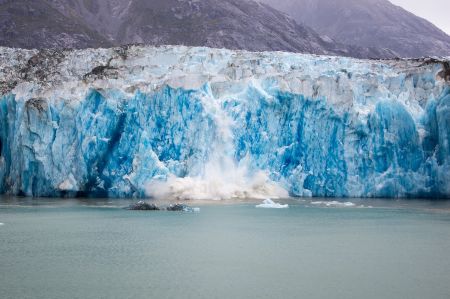
We came from water, and it is still there in our tissues and blood, and just as the surface of Earth is over 70% its ocean, rivers, or fresh water lakes, so is our own water content at birth and, if we are not dehydrated, our brains' water ratio throughout life as well. Some even think we once were water mammals, filling a niche a little like seals or dolphins. Ironically, though, even as it buoys us up when we swim so well and is essential for us to drink in regular and fairly large quantities, it will kill us in a short time. We must around water be above it all or carry our air and warmth with us wherever in it we go. And so, it is a remarkable thing that among humans' early adventures were awesome explorations across the waves, so much so that our distant human ancestors reached a wholly separate continent, Australia, 57,000 to 65,000 years ago, long before there were sophisticated means of shipbuilding, sailing, or navigation. We have thus for many millennia been a maritime people.
This, incidentally, encourages me to think that, while it is certainly possible early "First People" traversed a land bridge we now call Beringia from Asia to North America when oceans were lower, allowing then for Native Americans to populate this land, it seems more likely, even if archeological confirmation can never be found, that the initial human venturers to reach the Americas probably came by boat, first hugging the shores between what are now Siberia and Alaska, then gradually following them down the western hemisphere's Pacific coasts.
As a boy, prehistoric ocean voyages had fascinated me, as have seafaring ways in general into adulthood, so that among my favorite yarns are the set of twenty Patrick O'Brian novels, about mainly Napoleonic era naval voyages and engagements, the submariner tale, Run Silent, Run Deep, by Edward L. Beach, Jr., Two Years Before the Mast, by Richard Henry Dana, Jr., and, more recently, the David Poyer series of nautical thrillers. My viewing pleasure has also been influenced by this interest, especially with the documentaries, "Victory at Sea" and "Battlefield - the Battle of the Atlantic," not to mention, of course, the sci-fi series, "Star Trek" and "Star Trek - the Next Generation," about imaginary voyages across the near infinity of space.
My own experiences with boats and ships have been ironically meager. Among earliest memories are being on a New Jersey beach with my mother (and it must have been back about 1946), seeing a large hulled overturned wooden boat a few yards away, and smelling the freshly caught fish, its daily catch. In childhood too there was later a trip with relatives next to Niagara Falls in a little boat called "Maid of the Mist."
When our family lived in VA, not far from Washington, DC, and the Potomac River, Dad would on occasion take us to boat shows. I was still young but remember vividly a speedboat race in which in a split-second one contestant's vessel corkscrewed, smashed down onto the waves wrong side up, and the craft broke apart, the driver killed in the accident.
There have been several rides on ferries across bays or channels out to a few islands. I enjoyed a handful of small rowboat day trips on lakes or rivers. I had only canoed while in summer camp, on outings with Boy Scouts, or over long weekends with some of my brothers. Then, when I met my wife, Valerie, she introduced me to kayaking, with which she was already proficient. Indeed, her parents were avid canoeists or kayakers, her mother, Evelyn, actually winning awards from their kayak club for over 1000 miles a year on the water. Till one of my brothers voyaged by kayak down the length of the Missouri River to its merging with the Mississippi and thence to the Gulf of Mexico, her small boat experiences had been the most impressive in my acquaintance.
Folks have told me about the wonders of ocean cruises. Perhaps one day I shall try them out, but as yet they have little appeal, seeming a bit too tame, though I would feel lucky by such means to maybe see large whales close-up or a glacier calving before I leave this mortal coil. In the meantime, it appears my watery exploits may have to mostly remain vicarious.